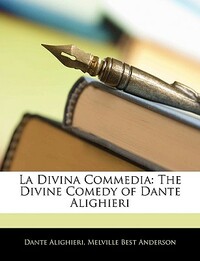You need to sign in or sign up before continuing.
Take a photo of a barcode or cover
311 reviews for:
La Divina Commedia: The Divine Comedy of Dante Alighieri
Melville Best Anderson, Dante Alighieri
311 reviews for:
La Divina Commedia: The Divine Comedy of Dante Alighieri
Melville Best Anderson, Dante Alighieri
“Ey ruh ,sen ki ağladıkça olgunlaşmaktasın
Ve bu çileyi çekmeden Tanrı’ya kavuşamazsın”
Dante’nin öbür dünyada çıktığı yolculuğun ikinci aşaması olan Araf, cehennemlik günahlar işlemeyen ancak cennete gitmeyi hak edecek imana ya da amele sahip olmayanların cennete gitmeye hak kazanmayı beklediği bir durak. Cehennem ile Cennet arasında kalan bu yeri Dante dağa tırmanış gibi okura yansıtıyor. Yukarı doğru çıkıldıkça, cennete yaklaştıkça insanlar da günahlarından arınıyor, hafifliyor ve yüklerinden kurtuluyorlar. Ancak cennete ulaşmak sanıldığı kadar kolay değil. Yaşamının son dakikasında tövbe edenler, cennete giriş bileti alabilmek için kefalet ödemek zorundalar. Yaşamaya devam eden iyi ruhlu insanların ettiği dualar, gece gündüz durmaksızın yükselen yalvarış, pişmanlıklar, ağlamalar ve ağır bir tırmanış neticesinde cennetin kapılarına ulaşmak mümkün. Dante bu tırmanış esnasında yine ilk kitapta olduğu gibi birbirinden farklı insanlarla karşılaşıyor. Eski ve Yeni Ahit’e, 14. yüzyıla damga vurmuş tarihi olay ve kişilere bolca rastladığımız bu kitap içerisindeki atıflar bana tamamen yabancı olduğundan ve cehennemdeki aksiyonlar bu noktada azaldığından biraz yorucu bir okuma deneyimi oldu. Dante’nin bu kitabı cennete geçişi yumuşatmak için yazdığını düşünüyorum ve bütün umutlarımı cennete yoğunlaştırmış bulunmaktayım. Dante’nin cehenneminde ve arafında kadın figürlerine rastlamak pek mümkün değil. Yolun sonunda ışık huzmeleri ve hareler eşliğinde bizi karşılayan Beatrice elbette bir saflık ve temizlik sembolü olarak karşımıza çıkıyor. Dante herhalde bütün kadınları cennete yollamış olsa gerek, bakalım cennette bizi neler bekliyor, sabırsızlanıyorum.
Ve bu çileyi çekmeden Tanrı’ya kavuşamazsın”
Dante’nin öbür dünyada çıktığı yolculuğun ikinci aşaması olan Araf, cehennemlik günahlar işlemeyen ancak cennete gitmeyi hak edecek imana ya da amele sahip olmayanların cennete gitmeye hak kazanmayı beklediği bir durak. Cehennem ile Cennet arasında kalan bu yeri Dante dağa tırmanış gibi okura yansıtıyor. Yukarı doğru çıkıldıkça, cennete yaklaştıkça insanlar da günahlarından arınıyor, hafifliyor ve yüklerinden kurtuluyorlar. Ancak cennete ulaşmak sanıldığı kadar kolay değil. Yaşamının son dakikasında tövbe edenler, cennete giriş bileti alabilmek için kefalet ödemek zorundalar. Yaşamaya devam eden iyi ruhlu insanların ettiği dualar, gece gündüz durmaksızın yükselen yalvarış, pişmanlıklar, ağlamalar ve ağır bir tırmanış neticesinde cennetin kapılarına ulaşmak mümkün. Dante bu tırmanış esnasında yine ilk kitapta olduğu gibi birbirinden farklı insanlarla karşılaşıyor. Eski ve Yeni Ahit’e, 14. yüzyıla damga vurmuş tarihi olay ve kişilere bolca rastladığımız bu kitap içerisindeki atıflar bana tamamen yabancı olduğundan ve cehennemdeki aksiyonlar bu noktada azaldığından biraz yorucu bir okuma deneyimi oldu. Dante’nin bu kitabı cennete geçişi yumuşatmak için yazdığını düşünüyorum ve bütün umutlarımı cennete yoğunlaştırmış bulunmaktayım. Dante’nin cehenneminde ve arafında kadın figürlerine rastlamak pek mümkün değil. Yolun sonunda ışık huzmeleri ve hareler eşliğinde bizi karşılayan Beatrice elbette bir saflık ve temizlik sembolü olarak karşımıza çıkıyor. Dante herhalde bütün kadınları cennete yollamış olsa gerek, bakalım cennette bizi neler bekliyor, sabırsızlanıyorum.
challenging
reflective
slow-paced
Plot or Character Driven:
N/A
Strong character development:
No
Loveable characters:
No
Diverse cast of characters:
No
adventurous
challenging
reflective
slow-paced
Plot or Character Driven:
Character
Strong character development:
Complicated
Loveable characters:
Complicated
Diverse cast of characters:
Yes
Flaws of characters a main focus:
Complicated
challenging
informative
slow-paced
Plot or Character Driven:
A mix
Strong character development:
Yes
Loveable characters:
No
Diverse cast of characters:
Yes
Flaws of characters a main focus:
Yes
dark
hopeful
reflective
slow-paced
Plot or Character Driven:
N/A
Strong character development:
No
Loveable characters:
No
Diverse cast of characters:
No
Flaws of characters a main focus:
Yes
In the second volume of Dante’s Divine Comedy, Purgatorio, Dante continues his journey from hell into purgatory, continuing to be guided by the skilled hand and mind of Virgil. Dante must climb up the Mount of Purgatory, beginning at the bottom with Ante-Purgatory, then the seven terraces – seven levels of suffering and spiritual growth – as associated with the seven deadly sins; at the very top is Earthly paradise. Just as in the first volume, Inferno, Dante continues to discuss politics and the Church in general, as well as relating to his own experiences during the writing of the Divine Comedy in the fourteenth century. Familiar characters in Dante’s life again play a part, as he makes his intentions of them all too clear. It is in this volume that Dante is reunited with his long-lost love, Beatrice.
In this shorter introduction, Robert M. Durling and Ronald L. Martinez go into some detail on when this second volume was likely begun, how and when it was exactly written and how Dante was influenced by events and happenings in his life in the writing of it. Just as with the first volume, detailed notes are provided at the end of each canto, explaining locations, historical references, and short biographies on the people mentioned and what relevance they had to Dante. With these priceless details, any reader can pick up this translation of the Divine Comedy, and not feel lost or overloaded by all the historical setting, peoples and details, but are skillfully guided along Dante’s unique journey.
At the end of the text are further detailed notes and fifteen short essays covering Dante’s political views, his respect and use of Virgil and Ovid, his original conceptions of homosexuality, and on moral growth, to name a few. Durling and Martinez also explore similarities and possible linkages with the three volumes in analyzing similar cantos, their possible relations to each other, as well as the numbering system used in each volume. At the end is a bibliography and extensive index, allowing the reader to travel about the text freely and with little hindrance.
With this second volume, Durling continues what he began with Inferno, keeping the reader hooked with this accurate translation, along with the original Italian on the left-hand page, as Dante’s true skill as a storyteller and descriptive writer are brought to light as never before.
Originally written on April 10, 2011 ©Alex C. Telander.
For more reviews, and exclusive interviews, go to BookBanter
In this shorter introduction, Robert M. Durling and Ronald L. Martinez go into some detail on when this second volume was likely begun, how and when it was exactly written and how Dante was influenced by events and happenings in his life in the writing of it. Just as with the first volume, detailed notes are provided at the end of each canto, explaining locations, historical references, and short biographies on the people mentioned and what relevance they had to Dante. With these priceless details, any reader can pick up this translation of the Divine Comedy, and not feel lost or overloaded by all the historical setting, peoples and details, but are skillfully guided along Dante’s unique journey.
At the end of the text are further detailed notes and fifteen short essays covering Dante’s political views, his respect and use of Virgil and Ovid, his original conceptions of homosexuality, and on moral growth, to name a few. Durling and Martinez also explore similarities and possible linkages with the three volumes in analyzing similar cantos, their possible relations to each other, as well as the numbering system used in each volume. At the end is a bibliography and extensive index, allowing the reader to travel about the text freely and with little hindrance.
With this second volume, Durling continues what he began with Inferno, keeping the reader hooked with this accurate translation, along with the original Italian on the left-hand page, as Dante’s true skill as a storyteller and descriptive writer are brought to light as never before.
Originally written on April 10, 2011 ©Alex C. Telander.
For more reviews, and exclusive interviews, go to BookBanter
I thought this was way better than the first part. Even though the historical and biblical references were plenty, they weren’t as many as in the first book, and you could easily identify yourself with the simple nameless spirits that were expressing their in-between Hell and Heaven sufferings. Unsure if it was also better written or better translated, but this one struck a chord.
emotional
reflective
medium-paced
Very interesting to me, and a very different vibe to 'Inferno', which was voyeuristic punishment after punishment, whereas this had some hope and some more self-contained development just within the canticle, so I would honestly say if you're going to read one part of 'The Divine Comedy', this one might be the best choice!
Once again, really enjoyed the precise symmetry and symbolic numerology of the Cantos and the structure of Mount Purgatory, and the passage of time in relation to the spheres (is it just me or is the geocentric system of orbits and planets of Dante's time even more convoluted than the mysterious mess that is the universe as we currently know it???). Also lots of allegorical choice of colour which was interesting once I was familiar with it and could pick up on the symbolism.
If I'm being honest, Dante's Christian ideology was sometimes so ridiculous and hyperbolic that it made me laugh and I couldn't take any of it seriously, especially once Virgil was replaced by Beatrice (a sad moment as Virgil had grown on me, whereas Beatrice and Dante have some weird parental dynamics). We were taken into Eden surprisingly early in 'Purgatorio', and I actually learnt a lot about the structure of earthly paradise relative to eternal paradise according to medieval doctrine. Speaking of Eden, it was ridiculous! There's literally a river to make you forget your sins! And another to enhance your memory of good deeds! The taste is repeatedly described as "sweet" and likened to an addictive drug! If you ask me, Dante the Pilgrim's ego did NOT need further inflation... But more generally, these rivers really rubbed me the wrong way because it seems like such a superficial and false way to "purify" the souls, and made me suspicious of all the sunshine and rainbows (very literally) of the terrestrial paradise.
The fact that Dante never finished/didn't have access to the full text of 'The Odyssey' consolidates itself as a sort of running joke by this point in the 'Comedy'. So many exciting nuggets of classical reference, and even moreso the way in which Dante warped them to suit his message. I interpreted 'Purgatorio' as less of a political slant than 'Inferno', and more focused on questions of morality, God, philosophy, especially love vs. free will which kept coming up. This made it slightly more accessible to me because I was familiar with more of the general Old Testament references than the intricate political conflict of Dante's contemporaries and all the corrupt popes with similar names.
Mark Musa's translation was pretty good (can't speak for accuracy or how nice the language is compared to others) and I really appreciated the endnotes because he referenced lots of other translators and their interpretations of passages, as well as the links to other key texts and linking stuff to other moments in the 'Comedy'. I will say I didn't always agree with Musa, and found some of his conclusions a bit far-fetched, and sometimes he mentions that he changed a word from the original and I didn't see a good reason why, especially as the translation is blank verse. Couldn't find Musa's translation of 'Paradiso' so I got the Mandelbaum one instead, which I've read mixed things about, but at least that one is a dual edition so I can actually look at the Italian if I want (which I couldn't for this one). Just hope his endnotes are as good as Musa's because this really is hopeless to read without notes.
Did I agree with the ideology of this book? Not even a tiny little bit. But it was so juicy, so interesting to me, and all the elements of the symmetrical construction of it still blows my mind and I have to give credit to Dante for that while also strongly disagreeing with him on many points. Like with 'Inferno', not a rating of moral value but of how much it got into my head and yes, this really made me think.
Once again, really enjoyed the precise symmetry and symbolic numerology of the Cantos and the structure of Mount Purgatory, and the passage of time in relation to the spheres (is it just me or is the geocentric system of orbits and planets of Dante's time even more convoluted than the mysterious mess that is the universe as we currently know it???). Also lots of allegorical choice of colour which was interesting once I was familiar with it and could pick up on the symbolism.
If I'm being honest, Dante's Christian ideology was sometimes so ridiculous and hyperbolic that it made me laugh and I couldn't take any of it seriously, especially once Virgil was replaced by Beatrice (a sad moment as Virgil had grown on me, whereas Beatrice and Dante have some weird parental dynamics). We were taken into Eden surprisingly early in 'Purgatorio', and I actually learnt a lot about the structure of earthly paradise relative to eternal paradise according to medieval doctrine. Speaking of Eden, it was ridiculous! There's literally a river to make you forget your sins! And another to enhance your memory of good deeds! The taste is repeatedly described as "sweet" and likened to an addictive drug! If you ask me, Dante the Pilgrim's ego did NOT need further inflation... But more generally, these rivers really rubbed me the wrong way because it seems like such a superficial and false way to "purify" the souls, and made me suspicious of all the sunshine and rainbows (very literally) of the terrestrial paradise.
The fact that Dante never finished/didn't have access to the full text of 'The Odyssey' consolidates itself as a sort of running joke by this point in the 'Comedy'. So many exciting nuggets of classical reference, and even moreso the way in which Dante warped them to suit his message. I interpreted 'Purgatorio' as less of a political slant than 'Inferno', and more focused on questions of morality, God, philosophy, especially love vs. free will which kept coming up. This made it slightly more accessible to me because I was familiar with more of the general Old Testament references than the intricate political conflict of Dante's contemporaries and all the corrupt popes with similar names.
Mark Musa's translation was pretty good (can't speak for accuracy or how nice the language is compared to others) and I really appreciated the endnotes because he referenced lots of other translators and their interpretations of passages, as well as the links to other key texts and linking stuff to other moments in the 'Comedy'. I will say I didn't always agree with Musa, and found some of his conclusions a bit far-fetched, and sometimes he mentions that he changed a word from the original and I didn't see a good reason why, especially as the translation is blank verse. Couldn't find Musa's translation of 'Paradiso' so I got the Mandelbaum one instead, which I've read mixed things about, but at least that one is a dual edition so I can actually look at the Italian if I want (which I couldn't for this one). Just hope his endnotes are as good as Musa's because this really is hopeless to read without notes.
Did I agree with the ideology of this book? Not even a tiny little bit. But it was so juicy, so interesting to me, and all the elements of the symmetrical construction of it still blows my mind and I have to give credit to Dante for that while also strongly disagreeing with him on many points. Like with 'Inferno', not a rating of moral value but of how much it got into my head and yes, this really made me think.




